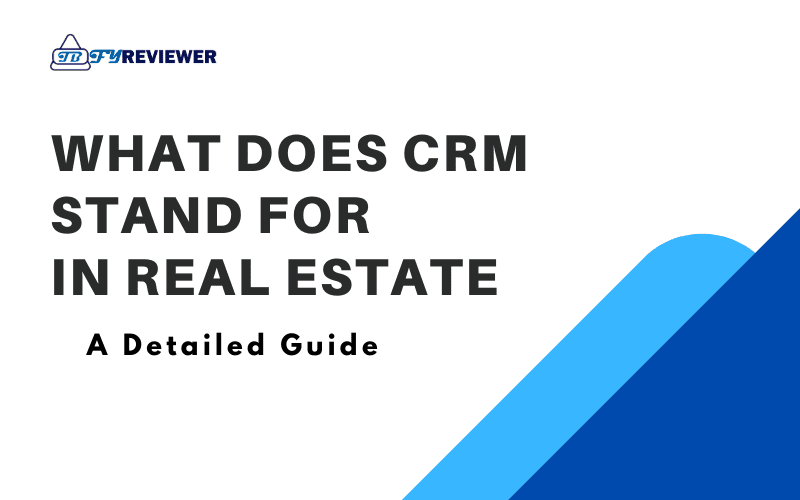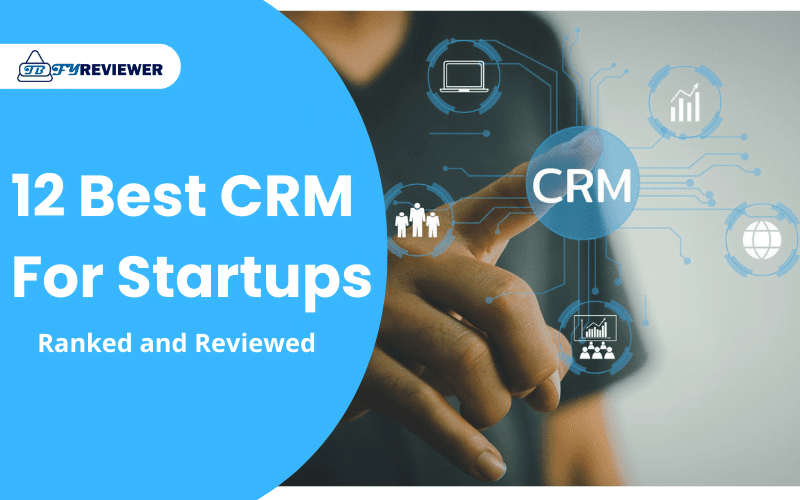Join TbfyReviewer’s newsletter to receive every new article.
What Does CRM Stand For In Real Estate: A Detailed Guide
Hossam jamjama
- October 21, 2025

If you are in the real estate industry, you might have heard of the term CRM. But what exactly does CRM mean in real estate? How important is it, and how can it benefit your business?
In this article, we will explore the basics of Customer Relationship Management in the real estate industry.
What Does CRM Stand For In Real Estate?
As the real estate industry becomes more competitive, maintaining strong relationships with customers is a crucial factor in staying competitive.
This is where Customer Relationship Management (CRM) comes into play.
CRM can be defined as a tool that enables companies to keep track of customer interactions, capture important data, and provide personalized support and care for customers.
In essence, CRM helps organizations to manage their customer relationships effectively.
Let’s dive into the details of CRM in real estate.
Definition and Overview of CRM
In real estate, CRM can be defined as a software system that provides agents with tools to manage their clients effectively.
From capturing lead information to tracking transaction details, it allows real estate professionals to streamline their operations while improving communication and building stronger relationships with their clients.
Discover What is a CRM in Real Estate in detail.
The Role of CRM in the Real Estate Industry
The real estate market has traditionally been known for its intense competition. With so many players vying for attention and potential buyers, it’s essential for agents to establish strong relationships with their clients.
CRM plays an important role in this regard by providing agents with insights into customer behavior and preferences. By analyzing this data, agents can provide valuable insights that help clients make informed decisions about their purchase or sale.
Check out also What Role Can A CRM Play In Effective Martech Stack.
Benefits of Implementing CRM in Real Estate
Improved Customer Satisfaction and Retention
One of the most significant benefits of implementing CRM technology is that it makes it easier to keep track of customer interactions and capture important data about their preferences and needs.
By analyzing this data, agents can tailor their services to meet the specific needs of each individual client. This ultimately leads to happier customers who are more likely to return for additional services or refer others.
Streamlined Communication and Lead Management
Another benefit of using a robust CRM system is that it streamlines communication between various stakeholders within the organization.
From sales teams to marketing departments, everyone can access customer information from a centralized database.
This makes it easier for agents to manage leads and ensure that no potential opportunities slip through the cracks.
Enhanced Sales and Marketing Efforts
Marketing and sales are essential components of any successful real estate operation, and CRM can dramatically enhance both areas.
By tracking customer behavior, preferences, and purchase history, agents can create more targeted marketing campaigns that resonate with their target audience.
Additionally, by analyzing this data regularly, they can identify patterns and trends that allow them to optimize their sales approach over time.
Increased Productivity and Efficiency
Finally, by using a CRM system to manage their clients’ details, agents can free up more time to focus on core activities like generating leads and closing deals. This increased efficiency not only benefits the individual agent but also the entire organization as a whole.
If you are a startup owner, you can check our list of Best CRM for Startups.
Key Features and Functionality of CRM in Real Estate
Now that we have discussed the benefits of CRM in real estate let’s look at some of the key features that are essential for any good CRM system.
1. Contact and Lead Management
A good CRM system should allow you to capture and organize leads efficiently. This means being able to enter lead information quickly, categorize it appropriately, and store it securely.
The system should also enable you to track communication with each lead and monitor their interaction history.
Capturing and Organizing Lead Information
Your CRM system should have a simple interface for capturing all relevant lead information such as contact details, preferences, interests, source of inquiry, and so on.
It should also allow you to segment leads based on specific criteria such as geographic location, buying intent, stage of the buying process, and more.
Lead Scoring and Prioritization
Your CRM should allow you to assign scores to each lead based on their level of interest or readiness to buy. This helps you prioritize your efforts by focusing on the most promising leads first.
Tracking Communication and Interaction History
A good CRM system should keep a record of all communication with each lead such as emails sent/received, phone calls made/received, appointments scheduled/canceled, or anything else.
2. Automated Email Marketing and Drip Campaigns
Email marketing is an important part of any real estate agent’s work that helps to convert leads into customers.
A CRM system should allow you to send personalized email campaigns to the targeted audience and automate the follow-up process.
Personalized Email Campaigns for Targeted Audiences
Your CRM system should allow you to create personalized email campaigns for targeted audiences using templates.
It should also enable customization of the message body and subject line based on lead information.
Automated Follow-ups and Nurturing
A good CRM software can automate follow-up emails, reminders, and newsletters.
It enables efficient lead nurturing by sending automatic follow-ups according to the stages of a lead’s buying process.
3. Transaction and Deal Management
A CRM system is an effective tool in managing your real estate transactions from end-to-end from listing properties to closing deals.
Managing Property Listings and Inventory
Your CRM system should allow you to manage property listings and inventory from a central database without any duplication of efforts.
Each property should have detailed information recorded such as amenities offered, location, and cost details.
Tracking Deals and Negotiations
A good CRM system should track each deal’s negotiation status so your team knows what’s needed from them at every stage of the transaction until its completion.
Coordinating Closing Processes
Your CRM system should coordinate closing processes with all relevant parties i.e. lawyers, home inspectors, title insurance companies, etc.
4. Analytics and Reporting
A good CRM system provides essential data-driven insights into sales performance metrics that help in examining trends, setting targets, improving strategies, increasing customer satisfaction rates, developing marketing plans, and so on.
Tracking Performance Metrics and KPIs
Your CRM system should track important performance indicators such as conversion rates, funnel stages (initial inquiry to final sale), agents’ performance, leads generated through various sources, etc.
Generating Reports and Insights
Your CRM system should also generate reports that provide insights into client behavior such as inquiries by demographics, preferred communication channels, and more.
It should enable real-time tracking of the daily, weekly, and monthly performance levels of your agents to improve sales optimization.
Choosing the Right CRM System for Real Estate Professionals
After we explored the details of CRM, it is also important to understand why choosing the right CRM system for real estate professionals is important.
The right CRM solution can help you manage your clients more efficiently, improve productivity and increase sales.
Evaluating CRM Requirements for Real Estate
To choose the right CRM system, you need to evaluate your specific requirements as a real estate professional.
Factors such as the number of agents in your team, the types of properties you deal with, and your budget will all play a role in determining what kind of CRM system would work best for you.
Popular CRM Solutions for Real Estate
There are several popular CRM solutions available in the market today that cater specifically to the real estate industry. These include:
Check out our list of the Best CRM for Real Estate Investors, and pick the right solution for your business.
CRM Comparison: Features, Pricing, and Integration
Each of these solutions has its own unique features, pricing plans, and integration capabilities. It is important to compare their strengths and weaknesses before deciding on one.
When comparing CRMs for real estate professionals, some key features to look at include:
- Lead management capabilities.
- Automated marketing options.
- Customizable workflow automation.
- Mobile access points.
- Data organization/storage capabilities.
- Hierarchical level user permissions.
Considerations for Implementation and Integration
On-Premise vs. Cloud-Based CRM Systems
One important consideration when implementing a CRM system in real estate is choosing between an on-premise or cloud-based solution.
An on-premise solution can be more secure but requires a dedicated infrastructure for deployment and maintenance.
Cloud-based solutions offer greater flexibility and scalability but may require a decent internet connection to ensure high quality service delivery.
Integration with Existing Tools and Software
Another important consideration when choosing a CRM system is how it will integrate with your existing tools and software.
A well-functioning CRM should work seamlessly with your email marketing software, lead capture tools, content management systems, social media platforms, and other applications.
Check out also our list of Best Real Estate Wholesaling Software.
Best Practices for Utilizing CRM in Real Estate
Once you have selected a CRM system that suits your needs, the next step is to implement it for maximum efficiency.
Here are some best practices for utilizing CRM in real estate:
Setting Up and Customizing CRM for Real Estate
Start by setting up your CRM to reflect your business processes. This includes customizing fields according to your needs, creating email templates, and defining user roles and permission groups.
You should also make sure the system is populated with accurate data on all your clients.
Training and Adoption Strategies
To ensure that everyone on your team fully adopts and regularly uses the CRM system, proper training is essential.
By organizing hands-on training sessions, workshops, or webinars for users at different levels of the organization, you can train your team on proper usage while identifying which features need addressing further.
Moreover, staff should be sufficiently motivated into using these tools via incentivisation systems akin to performance rewards for working efficiently or regularly using the system.
Ensuring Data Accuracy and Security
One aspect of using a CRM system that is often overlooked is data accuracy and security.
It is important to ensure that all data inputted into the system is correct so as not to compromise subsequent workflows or future client engagement opportunities due to incorrect data.
Maintaining security protocols must be tightly enforced– best practices include highlighting robust password guidelines and routine database backups to prevent disastrous data breaches that can damage reputation.
Incorporating CRM into Real Estate Workflows
To get the most out of your CRM system, it is important to integrate it into your day-to-day workflow. This can be done by incorporating CRM functionalities like email campaigns, automated calendars, and personalized client alerts directly into your sales process.
By doing so, you’ll be able to create a more engaging and personalized selling experience.
Leveraging CRM for Client Engagement and Follow-ups
A CRM system can also be used for client engagement after closing a business deal.
By providing relevant follow-up messages that reflect their prior experiences with you, you can foster relationships with clients that transcend individual transactions.
You can use automation rules and segmentation based on previously collected client data to send alerts or monthly newsletters highlighting relevant industry updates in geographically similar areas where you have previously sold properties.
CRM Trends and Future Outlook in Real Estate
Looking towards the future of CRM systems in real estate, here are some trends worth watching:
Personalization and AI-driven Insights
Incorporating an AI-driven approach could leverage greater personalized content generation as well as providing new levels of analytic capacity at quicker speeds than ever before.
That being said, personalization becomes king — those agents who provide tailored services will succeed over agents delivering generic solutions.
Mobile CRM and On-the-Go Accessibility
Thanks to smartphone technology, agents are switching towards mobile CRMs to allow them to make real-time updates on both desktops and devices at any means of convenience – this allows for drastically improved agent response times while meeting on-site with potential buyers or current sellers.
Integration with Virtual Reality (VR) and Augmented Reality (AR)
With augmented reality becoming more popular when showing listings thanks to easily accessible devices like Oculus Quest 2, virtual house tours become more accessible in real estate than ever before.
Various online platforms, as well as realtor websites, allow users to create virtual tours making transactions a more efficient and streamlined experience for clients without requiring long travel times to see multiple properties.
Conclusion
In conclusion, a CRM system tailored to fit your real estate business model is crucial for success in today’s highly competitive and data-driven market.
From efficient lead management to automated marketing campaigns, CRM technology can streamline processes, boost productivity, and provide essential data-driven insights.
By choosing the right CRM system, personalizing it to fit your needs, and training your team properly, you can enhance client engagement opportunities and overall business success.
Furthermore, these trends are continuously evolving with new developments such as AI integration and virtual house tours reshaping real estate industry practices.
So remember, what does CRM stand for in real estate? Your key to profitable business growth and customer satisfaction.
- Last Update OnOctober 21, 2025
- ByHossam jamjama

Hey, I’m Hossam, the founder of TBFYReviewer. I’m passionate about technology and how the right software can empower people and businesses to work smarter and grow faster.
Here, I share honest reviews and practical insights about the best SaaS and IT tools to help you choose what truly fits your goals. I believe technology should make life easier, not more complicated.
Let’s connect on LinkedIn, I always enjoy meeting curious minds who love tech as much as I do.
Disclosure: TbfyReviewer is a participant in various affiliate programs, which means we may earn a commission when you buy something through links on our site at no cost to you if you decide to purchase a paid plan. You can read our affiliate disclosure.




